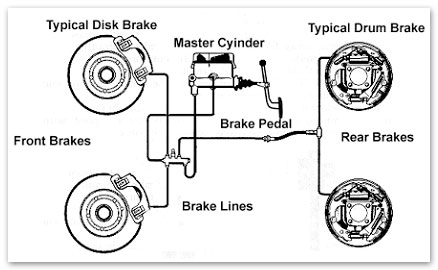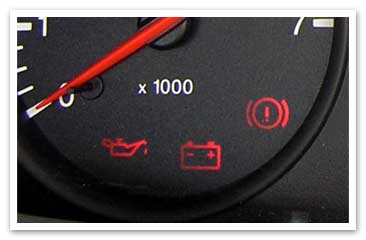What Do Squeaky Brakes Mean
It’s important to take good care of your vehicle and make sure it receives regular maintenance. Doing this will save you from having to pay for costly repairs down the line, and it will also help keep you and your passengers safe on the roadway. However, even regular maintenance does not guarantee that your vehicle will never malfunction.
One common area of maintenance is your vehicle's brakes.
 Brake System
Brake System
What do squeaky brakes mean?
Squeaky brakes are annoying. There are many things that can cause your brakes to squeak, from simple reasons to more serious ones. Here are some reasons your brakes may be squeaking:
- You're braking too hard. When you brake hard on a regular basis, your brake pads start to wear out and may start to squeak.
- Your brake pads are worn out. This happens over time, and the squeaky noise may be an indicator that you need to swap out your brake pads.
- Your brakes are wet. You may notice your brakes are squeaky after it rains. This is normal, and will clear up as your brakes dry. However, moisture on your brakes can cause rust to form, which can cause problems, so keep an eye on them.
- Dust or debris has collected on your brake rotors. You can clean your brake rotors yourself, or if you're uncomfortable doing so, take your vehicle to an auto repair shop to have them cleaned professionally.
- Your brakes weren't installed properly. If this is the case, make sure you take your vehicle to a trusted mechanic as soon as possible to get them fixed!
If you hear screeching noise when you brake, or if your vehicle starts to shake and pull to one side while braking, it may be a sign that you need new brakes. Sometimes the sound is caused by your brake pad indicators, which let you know that your brake pads are dangerously worn out and need replaced. Take your vehicle in to an auto repair shop to get looked at right away.
Why is brake maintenance important?
Poor or failed brakes often lead to collisions. You should have your brakes checked at least once a year, typically when you have your oil changed and your tires rotated. During these checks, make sure the following are inspected: brake pad and brake lining wear, brake fluid level, rotor thickness, condition of hoses and brake lines, and brake lights and dashboard warning lights.
Do I need to check my brake fluid?
You can periodically check your brake fluid to make sure you haven't run out. Just pop the hood and locate the brake master cylinder. This is usually located on the driver’s side of the vehicle, toward the back of the engine compartment. Check your owner’s manual if you are not sure where it’s located. If the cylinder is transparent, you should be able to see where the fluid is without removing the cap; if your cylinder is not transparent, you will need to remove the cap to see the “minimum” and “maximum” fill lines. The fluid level should be between these lines. If the fluid is too low, you’ll need to fill it up. Check your owner’s manual to see what type of fluid your vehicle will need.
What does the brake warning light on my dashboard mean?
If your brake warning light comes on while you’re driving, get your brakes looked at immediately. Don’t wait until it’s more convenient or your day off—take your vehicle in to get looked at right away. This light generally indicates that the pressure on one side of the braking system is lower than the other. Your hydraulic fluid could be low, or there could be a leak in your braking system. Do not drive your car in this condition.
 Warning Lights
Warning Lights
As a general rule, you should get your brakes professionally-inspected every six months when you have your tires rotated. That being said, there's no set timetable for when you need your brakes inspected. If you have a long daily commute, you'll need your brakes checked more often than someone who only drives a couple times a week to run errands.
What should I do if my brakes fail?
Sometimes, you may not have any warning that there’s something wrong with your brakes. You may be driving on the freeway when you suddenly notice that the brake pedal is spongy and goes all the way to the floor when you press it.
When your brakes fail, the worst thing you can do is panic. Knowing what to do in this situation can help you keep your cool. First, try pumping the brakes to regain pressure. If that doesn’t work, shift your vehicle into a lower gear and cautiously apply your parking brake (also called the emergency brake). Pull off to the side of the road as soon as possible and call to have your vehicle towed.
If none of these techniques work, as a last resort you may have to find a “soft” crash area. Look for bushes or shrubs and avoid other vehicles or concrete dividers. If possible, steer uphill, as this will help slow you down.
Take an Online Course to Learn More
If you enjoyed this article and are interested in learning more about driving-related topics, you should check out our courses on www.safe2drive.com.
We offer courses in a variety of topics including Defensive Driving and Driver Education. In addition to teaching you how to be a safe driver, our courses can help you dismiss a ticket, get your driver license, or even get an insurance discount. We also have courses specifically tailored to mature drivers (i.e., drivers age 55 and older) for insurance discounts.